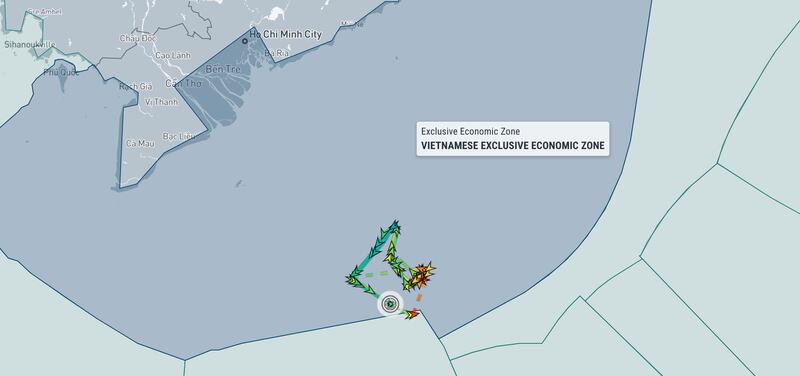Chinese coast guard ship 5901, dubbed “The Monster” for its size, has been near Vietnam’s oil exploration blocks at Vanguard Bank in the South China Sea since early December, Radio Free Asia has learned.
The CCG 5901 has "conducted an intrusive patrol of Vietnam's oil and gas fields west of Vanguard Bank," said Ray Powell, director of the U.S.-based SeaLight project, who was the first to spot the latest movement of the vessel in Vietnam's exclusive economic zone (EEZ).
An EEZ gives a state exclusive access to the natural resources in the waters and in the seabed.
Data obtained by RFA from tracking website MarineTraffic show the CCG 5901 (formerly known as Zhong Guoa Hai Jing 3901) has weaved an on-and-off pattern west of the Vanguard Bank, where Vietnam has some oil exploration projects, since at least Dec. 9, 2023.
MarineTraffic uses AIS (automatic information system) signals that ships are obliged to transmit for safety reasons to track them.
The Chinese ship has mostly been running “dark”, or not broadcasting AIS, since departing Sanya, Hainan, on Nov. 14, 2023, according to Powell.
“This frequent practice violates the International Convention for the Safety of Life at Sea, of which China is a signatory,” he added.

The last time the CCG 5901 turned on its AIS was on Jan. 7, 2024 at around 8:20 a.m. UTC. The ship was about 50 nautical miles (92.6km) southwest of Vanguard Bank. Several Vietnamese fishery patrol vessels were seen tailing the Chinese ship.
The Chinese ship’s AIS was also activated on Dec. 9 and Dec. 29, 2023.
The 12,000-ton CCG 5901 is double the size of a U.S. Navy Ticonderoga-class guided missile cruiser and is also bigger than an Arleigh Burke-class guided missile destroyer.
The coast guard ship, armed with heavy machine guns, also has a helicopter platform and a hangar large enough to accommodate larger rotary wing aircraft.
Shared future
Vanguard Bank, called Bai Tu Chinh in Vietnamese, is an important site of Vietnamese oil and gas development where Vietnam and some foreign partners carry out oil and gas exploration.
It is also a known flashpoint between Vietnam and China – their law enforcement vessels confronted each other in July 2019 in one of the worst maritime standoffs in the South China Sea between them in recent years.
Chinese coast guard vessels maintain a frequent presence near the Vanguard Bank (Wan’an Tan in Chinese) – a submerged formation that lies entirely within Vietnam’s EEZ.
China is among the six parties that hold claims over the South China Sea but Beijing’s claim is by far the largest, covering almost 90% of the sea.
“The [incursion] is not new but it happens right after Vietnam and China agreed to build a ‘Community with a Shared Future’ during Xi Jinping’s visit to Hanoi in December,” said Le Hong Hiep, a senior fellow at Singapore's ISEAS-Yusof Ishak Institute.
The concept of a ‘Community with a Shared Future’ is China's vision for international relations in the Chinese leader, Xi’s Jinping era.
“That shows that essentially the Vietnam-China bilateral relations have not changed and it remains very difficult for the two countries to share a future should China continue pursuing its current claim over nearly-entire South China Sea,” Hiep told RFA.
Another Vietnamese political analyst, Nguyen Khac Giang, said that the Chinese coast guard patrols “may be sending a message to not only Vietnam but the broader international community about China’s sovereignty in the South China Sea.”
“On the other hand, China wants to maintain its pressure to interrupt Vietnam’s oil and activities in the area, as well as to push Hanoi to agree to a joint exploration plan with China in the same manner as what it achieved with the Philippines under the Duterte administration,” said Giang.
In 2018, Manila and Beijing signed an agreement to explore oil and gas reserves in the South China Sea but the Philippines declared an end to it in June 2022, after President Ferdinand Marcos Jr. took power.
The two countries, however, had agreed ‘to resume discussions on oil and gas development” after Marcos visited Beijing in December.
Edited by Mike Firn and Elaine Chan.
